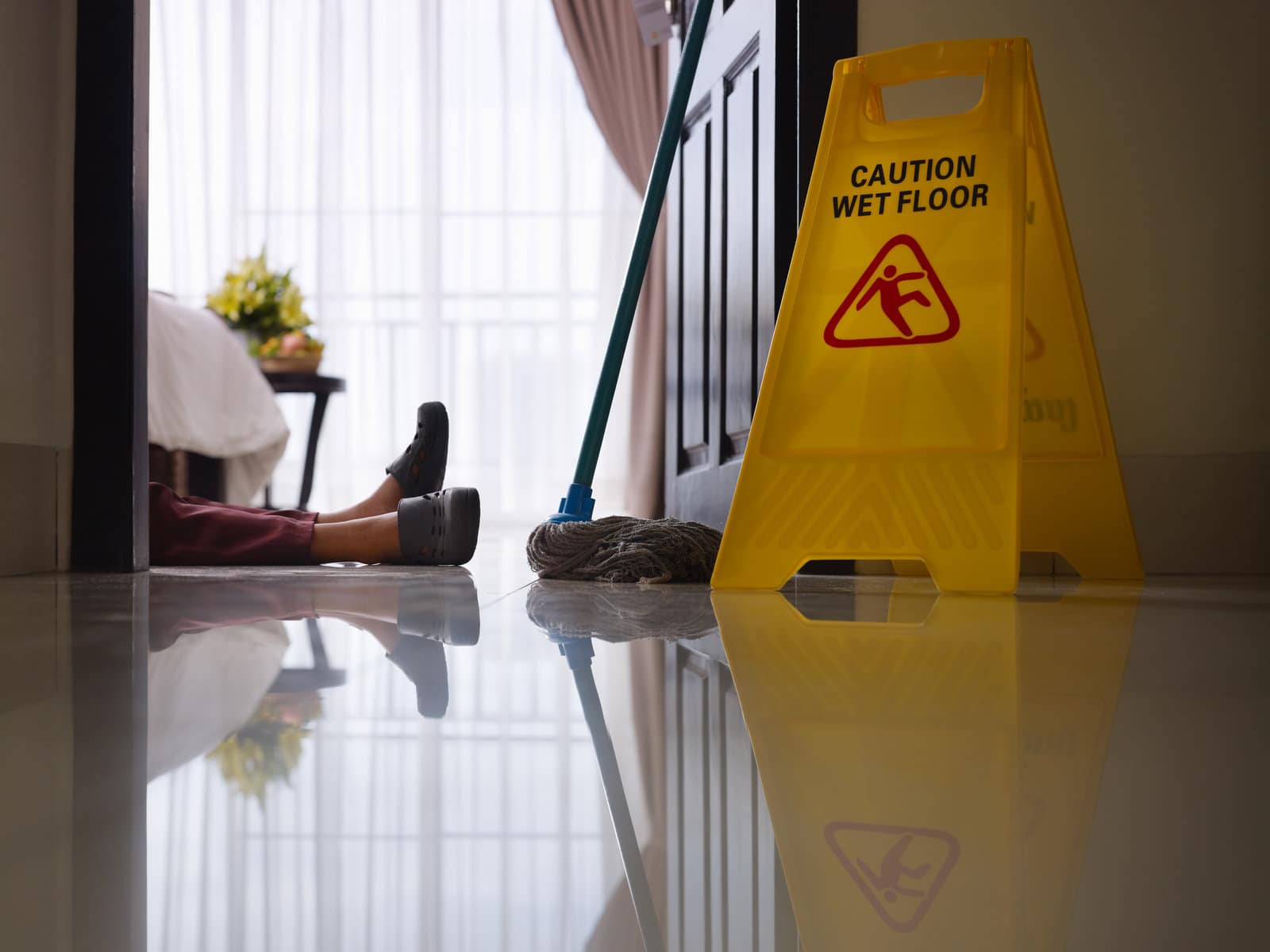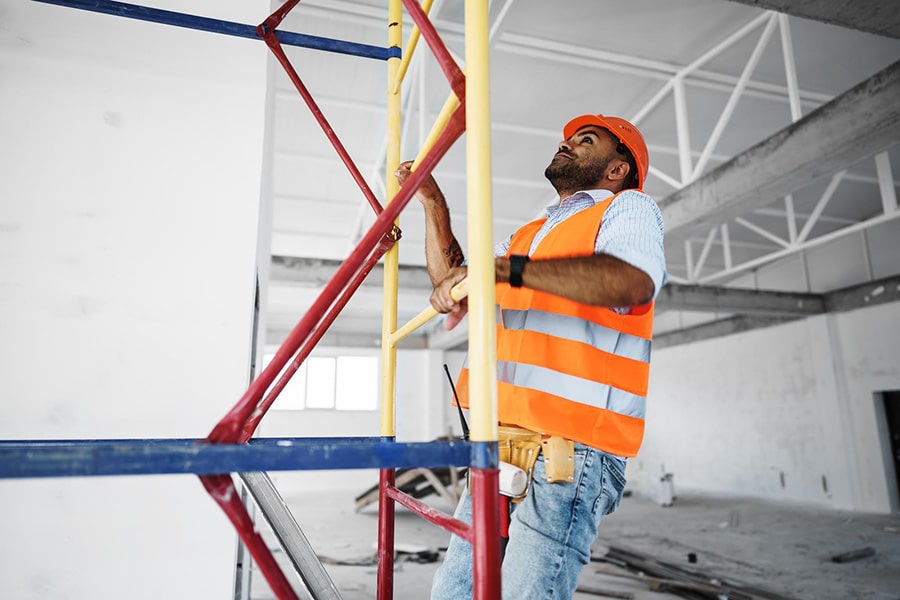Learn about your rights after a
slip and fall accident at work in Charlotte
Whether you work outdoors or in an office, your employer is obligated to provide information, training, and equipment to help keep you and your coworkers safe. Workplace slips and falls are among the most common types of injuries that occur.
Fortunately, in North Carolina and throughout the country, most employers are required to purchase workers’ compensation insurance, which provides certain benefits to employees who suffer on-the-job injuries.
If you’ve recently suffered such an injury in Charlotte, read on to learn more about your right to workers’ comp benefits during your recovery and how to file a claim to maximize your compensation.
Did you know?
The Centers for Disease Control and Prevention (CDC) rates slips and trips among the top 3 causes of work-related injuries that require treatment in emergency rooms annually.
In 2022 alone, more than 337,000 workers were injured due to slips, trips, and falls, according to the National Safety Council. That same year, 865 workers died in these accidents, including 144 workers who fell on the same level, as opposed to from elevated heights like ladders, roofs, or scaffolds.
Which workers are most at risk for slip and fall accidents?
While slip and fall accidents can happen in any workplace, certain professions expose workers to a greater risk. Below are some of the most vulnerable types of workers:
- Construction workers. Uneven surfaces, cluttered work areas, debris, and exposure to the elements all create a dangerous environment for slips and falls on construction sites. Climbing ladders, scaffolding, and working at heights further elevate the risk of falls, especially for roofers.
- Retail and grocery store workers. Wet floors from mopping, product spills, and cluttered aisles all pose slip and fall hazards for retail workers. Additionally, reaching for stock on high shelves can further increase the risk.
- Janitorial and maintenance staff. These workers are constantly exposed to wet floors due to cleaning duties. They might also encounter uneven surfaces, loose mats, or poorly lit areas, all contributing to a higher risk of slips and falls.
- Health care workers. Hospitals, nursing homes, and other health care facilities often have wet floors from cleaning solutions, spills, or bodily fluids. Working long hours, rushing to answer calls, and carrying heavy equipment can also contribute to fatigue and inattention, increasing the risk of slips and falls.
- Restaurant and hospitality workers. Spilled food and drinks, greasy floors in kitchens, and heavy trays are common hazards in restaurants and hotels. These factors, combined with fast-paced environments, can lead to slip and fall accidents for waitstaff, chefs, and housekeeping personnel.
It’s important to note that any job that involves working on wet or uneven surfaces or at elevated heights can increase the risk of slip and fall injuries.
A guide to ladder & scaffolding accidents at work in Charlotte
Learn how to recover maximum compensation after suffering an injury from a ladder or scaffold mishap at work.
What causes the majority of slip and fall accidents?
The majority of slip and fall accidents both at and outside of work stem from commonplace hazards like wet floors, uneven surfaces, and clutter. These seemingly minor issues can cause a loss of footing and lead to falls, especially in professions where workers are constantly on the move or in fast-paced environments.
What injury is most commonly the result of a slip and fall?
Contrary to popular belief, you don’t necessarily have to hit the ground to suffer an injury after slipping on a wet floor or tripping over an object in the workplace. Your body might be jarred forward and back or side-to-side, resulting in whiplash or muscle strain.
In addition to these injuries, the following are other types of injuries that are commonly seen in slip and fall incidents:
- Back injuries like herniated discs or even permanent spinal cord injuries
- Concussions, brain bleeds, fractured skulls, and other traumatic brain injuries
- Ankle sprains
- Contusions and lacerations
- Broken bones
- Internal bleeding and organ damage
- Pulled muscles and torn tendons
Keep in mind that it’s possible to suffer more than 1 injury as a result of a single slip and fall incident, some of which can be permanent. Brain injuries, internal bleeding, and spinal cord injuries in particular aren’t always immediately apparent, so it’s crucial to seek medical care and address any emerging symptoms immediately.
If you experience any new or worsening symptoms after seeking initial medical treatment, it’s crucial that you visit the nearest emergency room for further testing.
What workers’ comp benefits am I entitled to after a slip and fall accident?
Your employer’s workers’ compensation insurance is set up to provide benefits if you suffer an on-the-job injury. This insurance is no-fault insurance, which means that in most cases, eligible employees are entitled to compensation after an injury, even if the slip and fall accident was their fault.
The different types of workers’ comp benefits include:
- Medical benefits. All necessary medical bills and treatment related to your work injury are paid for by workers’ comp.
- Wage loss benefits. Workers’ comp also provides wage replacement benefits (typically two-thirds of your average weekly wage) if you have to take time off during recovery and are losing wages.
- Vocational rehabilitation benefits. If your injury prevents you from returning to your previous job, workers’ comp may cover the costs of vocational training or job placement assistance to help you find new employment.
- Death benefits. In the unfortunate event that a work-related injury results in death, workers’ comp provides financial support to the surviving dependents, including funeral expenses and ongoing financial assistance.
Keep in mind that while you won’t be required to prove the accident was anyone’s fault, you do need to be able to prove that any injuries you sustained were work-related.
While this is typically fairly straightforward if the accident occurred at work while you were performing your work duties, it’s essential that you seek immediate medical care to ensure you have documentation linking any injuries directly to your job.
What steps should I take after a slip, trip, or fall at work in NC to get workers’ comp benefits?
If you’ve been injured at work in North Carolina due to a slip and fall or any other type of accident, it’s important to take these steps to get workers’ comp benefits:
- Seek medical attention. When you seek medical treatment after tripping or falling at work, it creates written documentation of the incident (which is essential for a successful claim) and helps identify any unseen injuries so you can begin treatment. If possible, photograph your injuries and the area where the accident took place before leaving the scene.
- Report your injury to your employer. In most cases, this must be done in writing within 30 days to be eligible for workers’ comp.
- File a workers’ compensation claim. To officially file for benefits, you will need to submit Form 18 to the North Carolina Industrial Commission to start your claim. You should do this as soon as possible, but no later than 2 years from the date of your accident.
If your claim is denied or you want help determining how much compensation you should be entitled to, reach out to an experienced workers’ compensation attorney to ensure your rights are protected.
Steps to appeal a denied NC workers’ claim
Learn what you need to do to appeal a denied workers’ comp claim so you can get the compensation you deserve.
What are idiopathic falls, and how can they impact a workers’ comp claim?
Idiopathic falls are falls that occur without an identifiable cause, such as tripping over an object or slipping on a wet surface. These falls happen spontaneously, often due to underlying medical conditions or other unknown reasons. When an injury is labeled as an idiopathic injury in a workers’ comp claim, it can significantly impact the outcome.
Since idiopathic falls are not directly linked to the work environment or job duties, insurance companies and employers may argue that the injury did not arise out of employment. This can lead to the denial of the workers’ comp claim, as the fall may be considered unrelated to work activities.
Proving the connection between the fall and the work environment in these cases is crucial, so you’re highly encouraged to reach out to an attorney to discuss your claim if your employer suggests your fall resulted from a pre-existing health condition or any other non-work-related factors.
When can I sue a third party after a slip and fall at work?
In most cases, North Carolina law prohibits you from suing your employer after a workplace accident that resulted in an injury if you accept workers’ comp benefits. However, there are some exceptions to the rule.
For instance, if your employer failed to purchase the required workers’ compensation insurance, then you might be able to file a civil claim against them. Another exception might be if your employer committed an intentional, reckless act or an act of violence that resulted in your injuries.
But what if someone other than my employer was responsible for my injury?
If a third party, someone other than your employer, is responsible for your injuries, you may have grounds for filing a third-party personal injury claim in civil court if you can prove that their actions directly resulted in your accident.
For example, if you were injured due to a defective piece of equipment, you might file a lawsuit against the manufacturer of the equipment. Similarly, if a subcontractor’s negligence caused your injury, you could potentially sue that subcontractor.
A third-party personal injury claim can provide compensation for damages that workers’ comp does not cover, such as pain and suffering, emotional distress, and loss of enjoyment of life. But proving negligence in these cases is often complex, so it’s crucial that you consult an experienced work injury attorney to help you navigate your claims and ensure you receive the full compensation you’re entitled to.
Injured in a slip and fall accident at work in Charlotte? We can help!
Recovery from a slip and fall incident can be a long, arduous process. Filing a workers’ comp claim can be stressful, and legal problems may arise if your claim is denied. It’s helpful to seek additional support from a local workers’ compensation attorney who can advocate for your rights and ensure that you receive full compensation for your injuries.
At Wilder Pantazis Law Group, our skilled Charlotte work injury attorneys have more than 85 years of combined experience fighting to get injured North Carolina workers the justice and compensation they deserve after an accident at work.
Contact our office today to schedule a free consultation to learn how we can help with your claim.
References
CDC Archives. (n.d.). Archive.cdc.gov. Retrieved July 18, 2024, from https://www.cdc.gov/niosh/injury/fastfacts.html
Slips, Trips and Falls Home – National Safety Council. (n.d.). www.nsc.org. https://www.nsc.org/workplace/safety-topics/slips-trips-and-falls/slips-trips-and-falls-home
Top Work-Related Injury Causes – Data Details. (n.d.). Injury Facts. https://injuryfacts.nsc.org/work/work-overview/top-work-related-injury-causes/data-details/



